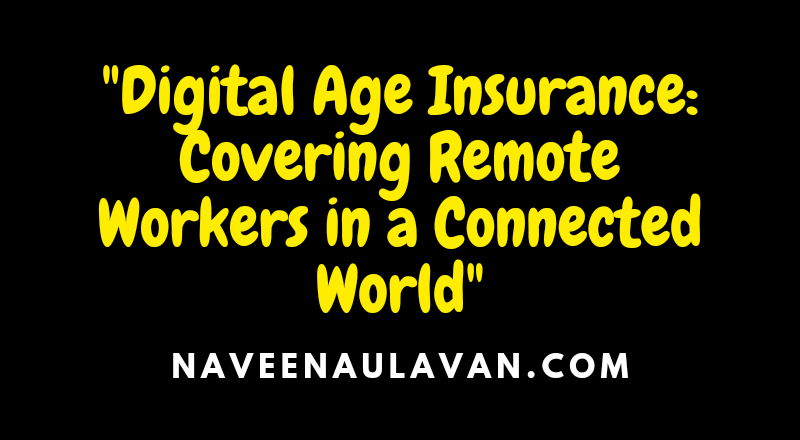The rise of remote work has become a defining feature of the digital age. Advancements in technology have allowed individuals to work from anywhere in the world removing the need for a traditional office setting. While this new way of working offers numerous benefits it also raises important questions regarding insurance coverage for remote workers. In a rapidly changing work landscape it is essential to understand the potential risks remote workers face and the insurance options available to mitigate those risks.
Risk Assessment for Remote Workers
Physical Risks
Remote workers are not exempt from facing physical risks even though they operate outside a conventional office environment. While working remotely individuals may encounter accidents or injuries that are not covered by traditional office-based insurance policies. For example a remote worker may slip and fall while working from a co-working space or experience a car accident while traveling to meet a client.
Insurance Gaps
Traditional insurance policies do not always account for remote work. Generally home insurance policies do not cover accidents that occur during work-related activities and personal auto insurance may be voided if a vehicle is used for business purposes without the appropriate coverage. This leaves remote workers vulnerable to potential financial losses.
Equipment Protection
Another crucial consideration for remote workers is the protection of their equipment such as laptops smartphones and other digital devices. These items are essential for remote work and losing or damaging them can disrupt productivity significantly. Standard homeowners’ or renters’ insurance policies typically have limited coverage for expensive electronic equipment used for business purposes further emphasizing the need for specialized coverage.
Insurance Options for Remote Workers
1. Business Liability Insurance
Business liability insurance is designed to protect individuals from third-party claims of property damage or bodily injury. Remote workers can benefit from this type of insurance as it provides coverage in scenarios where accidents or injuries occur while working outside the traditional office setting. Having business liability insurance safeguards remote workers from potentially costly legal claims.
2. Cyber Liability Insurance
Due to their reliance on technology remote workers face unique risks associated with cyber threats. Cyber liability insurance helps protect individuals against data breaches identity theft and cyberattacks. This type of coverage can help in mitigating financial losses resulting from compromised data as well as providing support for the necessary legal expenses and public relations efforts.
3. Equipment Insurance
To address the specific need for equipment protection remote workers can consider equipment insurance. This coverage is tailored to safeguard expensive digital devices used for work-related purposes such as laptops tablets and smartphones. Equipment insurance typically covers loss theft damage and repairs ensuring that remote workers can continue their work without interruptions.
4. Health Insurance
Since remote workers are not typically covered by an employer’s group health insurance plan they need to explore individual health insurance options. Health insurance provides coverage for medical expenses making it an essential aspect of insurance for remote workers. Depending on the country of residence there may be various options available including national health insurance programs private health insurance plans or hybrid models.
Conclusion
As remote work continues to grow in popularity addressing insurance coverage for remote workers becomes increasingly important. Remote work introduces unique risks that may not be adequately covered by traditional insurance policies. Remote workers should assess the potential physical risks they face and seek insurance options that fill the gaps in coverage. Business liability insurance cyber liability insurance equipment insurance and health insurance are just a few of the essential coverage options to consider. By proactively addressing insurance needs remote workers can mitigate potential financial burdens and focus on their work with peace of mind in the digital age.
